|
THE BEAVER
As if in homage to the connection between tobacco and the beaver in Canadian
history (17th-century fur traders opened negotiations with Native trappers
with gifts of tobacco), early cigar packaging made prominent use of the
beaver on revenue stamps
and box labels.
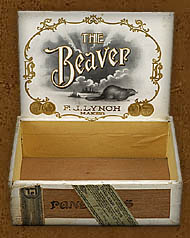 |
 |
THE BEAVER
Trimmed wood box (50)
Factory 16 IRD 38 Series of 1897
F. J. Lynch, Vancouver, B.C.
CMC 2004.38.3 |

 |
 |
SHAW'S SINGLE BINDER
Trimmed wood box (50)
Factory 2 IRD 39 Series of 1915
Edmonton Cigar Factory, Edmonton, Alb.
CMC 2003.46.101 |

 |
 |
BEAVER
Trimmed wood box (100)
Factory 26 IRD 26 Series of 1897
Andrew Wilson, Toronto, Ont.
CMC 2003.46.82 |

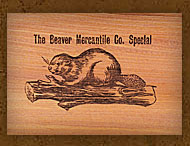 |
 |
THE BEAVER
MERCANTILE CO. SPECIAL
Trimmed wood box (50)
Factory 2 IRD 32 Series of 1897
Jose Gaste, London, Ont.
CMC 2003.46.34 |
THE MAPLE LEAF FOREVER—AND OTHER CANADIAN ICONS
By the time cigar boxes came along in the 1880s, the maple leaf had been in
use as a national symbol for nearly 40 years in both French and English
Canadian popular media such as sheet music and book-cover art.
There is only one Maple Leaf cigar box in the museum's collection, but there
are several boxes with the maple leaf as one Canadian motif among many.
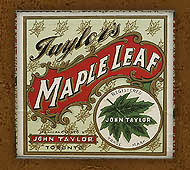 |
 |
MAPLE LEAF
Trimmed wood box (25)
Factory 2 IRD 26 Series of 1897
John Taylor, Toronto, Ont.
CMC D-9117 |

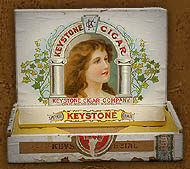 |
 |
KEYSTONE
Trimmed wood box (25)
Factory 6 IRD 36 Series of 1897
Keystone Cigar Company, Winnipeg, Man.
CMC 2004.38.62 |

 |
 |
EDMON
Trimmed wood box (50)
Factory 3 IRD 14 Series of 1915
Likely Edmond Cigar Co., L'Epiphanie, Que.
CMC 2005.41.4
A beaver, passant guardant proper (in the language of
heraldry—"standing on four feet, facing left, in its natural colour")
and multicoloured maple leaves frame a beaver dam in lush woods—in Ontario,
presumably, if that province's shield (bottom) is any indication. The quality
of the cigars is suggested by the gold medals flanking the shield.

|
 |
 |
JACK CANUCK
Trimmed wood box (25)
Factory 9 IRD 28 Series of 1922
F. Keil, Waterloo, Ont.
CMC 2003.46.2
In the last quarter of the 19th century, two national symbols
were introduced to Canadians: the Red Ensign flag, featuring the composite
arms of Canada's provinces, and a figure promoted in political newspaper
cartoons as an icon for the nation, Jack Canuck. Both appear on this label
along with a giant log and maple leaves, flanked by iconographic Canadian
scenes: beavers building a dam and farmers reaping wheat. |
A DOMINION WITHIN AN EMPIRE
Canadian and British iconography often appeared jointly on our cigar box
labels, reflecting the fact that for many Canadians at the turn of the 20th
century, the country's membership in the British Empire was a fundamental
part of their heritage and identity. [For Canadian boxes even more involved
with things British, go to The Mother Country.]

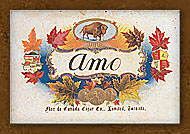 |
 |
AMO
Trimmed nailed wood box (50)
Factory 12 IRD 26 Series of 1897
Flor de Canada Cigar Co., Ltd., Toronto, Ont.
CMC 2001.185.26 Tony Hyman Collection
The Amo label features a Latin name and Canadian iconography:
autumn-hued maple leaves, a bison, and shields from the coats-of-arms of
Britain and Canada. The seven provinces represented on the
Canadian shield
tell you the label was designed before 1905 (when Saskatchewan and Alberta
joined Prince Edward Island, Nova Scotia, New Brunswick, Quebec, Ontario,
Manitoba, and British Columbia).

|
 |
 |
NATIONAL
Trimmed nailed wood box
Factory 5 IRD 14 Series of 1897
Manufactured for George J. Joy, Toronto, Ont.
CMC 2005.41.18
The sun rises (one would like to think) over the Canadian beaver
standing on a luxuriant bed of maple leaves, against a backdrop of Great
Britain's Union Jack and Canada's new Red Ensign flag.

|
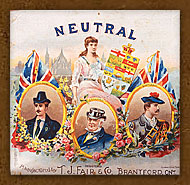 |
 |
NEUTRAL
Trimmed nailed wood box (50)
Factory 2 IRD 42 Series of 1897
T. J. Fair & Co., Brantford, Ont.
CMC 2003.46.77
A densely iconic if somewhat puzzling label. One guesses it
honours the equal allegiance owed by Canada to three of Great Britain's
component nations.

|
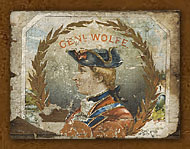 |
 |
GEN'L WOLFE
Trimmed nailed wood box (50)
Factory 17 IRD 32 Circa 1897
Likely G. Olmsted, London, Ont.
CMC D-13692
The brand names of 19th-century London, Ontario cigar makers
reflect an especially reverent attitude towards the connection between Canada
and Great Britain. G. Olmsted's "Gen'l Wolfe" memorialized the
commander of the British force that took Quebec in 1759 and ended French
rule in Canada. |
|
















